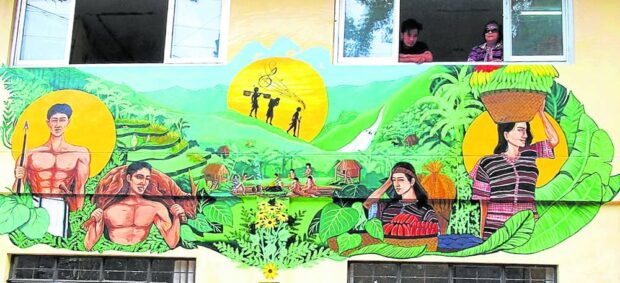BCDA asks Baguio to defer protection rule for IP land

HERITAGE ON THE WALL A mural on the walls of the barangay hall of Happy Hallow in Baguio City depicts the way of life of indigenous Ibaloys and Kankanaeys who have lived for generations in
this ancestral domain in the summer capital. —NEIL CLARK ONGCHANGCO
BAGUIO CITY — The Bases Conversion and Development Authority (BCDA) has urged the city council to defer a proposed ordinance that would designate Baguio’s only Ibaloy ancestral domain as a historical, cultural, and heritage zone, citing a pending case seeking its nullification.
BCDA respects the city’s initiative to preserve Ibaloy historical and cultural heritage, said Allen Garcia, president of BCDA estate manager John Hay Management Corp. (JHMC), in a July 13 letter to the council that was cited in its session on Monday.
But the agency tasked with overseeing former American baselands expressed its opposition to the draft ordinance because designating Happy Hallow as a heritage community may “unduly influence the adjudication of the rights and interests of both BCDA and Barangay Happy Hallow,” Garcia said in the letter.
He informed the council that BCDA, through the Office of the Solicitor General, had petitioned the Supreme Court to cancel the Certificate of Ancestral Domain Title or CADT (now registered as Original Certificate of Title No. 0-CALT-58) that was issued to Baguio Ibaloys in 2006.
The CADT recognizes 146.4 hectares of indigenous communal lands occupied by Ibaloys and Kankanaeys “since time immemorial” at Barangay Happy Hallow, which has a population of 2,674 residents, most of whom are farmers.
Article continues after this advertisementThe Indigenous Peoples Rights Act of 1997 (Ipra or Republic Act No. 8371) defines ancestral domains as communal lands settled by indigenous communities “since time immemorial except when interrupted by war, force majeure or displacement by force, deceit, stealth or as a consequence of government projects or any other voluntary dealings entered into by government and private individuals/corporations, and which are necessary to ensure their economic, social and cultural welfare.”
Article continues after this advertisementIpra encompasses “ancestral lands, forests, pasture, residential, agricultural, and other lands individually owned, whether alienable and disposable or otherwise, hunting grounds, burial grounds, worship areas, bodies of water, mineral and other natural resources, and lands which may no longer be exclusively occupied by [indigenous peoples or IPs] but from which they traditionally had access for their subsistence and traditional activities.”
Inside reservation
But Happy Hallow is within the 600-ha Camp John Hay reservation.
The draft ordinance sponsored by Councilor Isabelo Cosalan Jr. would allocate funds to protect and maintain Happy Hallow which it would declare a “historical, heritage and ecological district.”
Cosalan, an Ibaloy, said Happy Hallow would also be recognized as a National Historical, Heritage and Ecological Site, and would be entitled to the conservation rules and legal protection of the National Historical Commission of the Philippines.
Because the nullification case, docketed as G.R. Mo. 211889, remained pending with the high court, Garcia appealed for the Baguio government’s “utmost patience and understanding in deferring the passage of [Proposed Ordinance No. PO 0040-23]… in the interest of justice and to facilitate the alignment and implementation of policies in line with our respective mandates consistent with good governance for the benefit of the Baguio community.”
Details about the BCDA petition have not been made public.
But during the council’s April 5, 2021 session, BCDA and JHMC officials disclosed that the agency could not recognize ancestral land rights within Camp John Hay where BCDA has “vested rights.”
BCDA assured the council that it would fulfill all its obligations to Baguio “for as long as they do not contradict laws,” such as RA 7227 or the BCDA law.
This was a reference to the 19 conditions set by the Baguio City Council through Resolution No. 362 series of 1994, which BCDA accepted. In exchange, the city endorsed a master development plan that commercialized 246.97 ha of the former American rest and recreation baseland.
The fifth condition recognizes IP land claims inside Camp John Hay, which was the subject of a 1909 US Supreme Court ruling that legitimized the concept of the “Native Title.”
READ: BCDA blocks planned farm road in Baguio ancestral domain